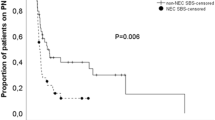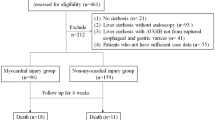Abstract
Background/Objectives:
Patients with a short bowel and receiving parenteral nutrition (PN) have an increased risk of chronic cholestasis (CC). Restoration of bowel continuity after a mesenteric infarction results in PN requirements being reduced or stopped. This study aimed to determine the prevalence of CC and whether restoring bowel continuity reduced the risk of CC.
Subjects/Methods:
A retrospective review of patients with a short bowel owing to mesenteric infarction from 2000 to 2012. CC was defined as two of bilirubin, alkaline phosphatase and gamma-glutamyl transferase being 1.5 times the upper limit of normal for >6 months.
Results:
We identified 104 (55 females, median age 54 years) patients. Seventy-three (70%) patients had restoration of bowel continuity; of these, 25 (34%) had abnormal liver biochemistry (liver function test (LFT)), with 15 (21%) having CC. Following restoration of bowel continuity, 8 (53%) of 15 patients with CC and 10 (100%) of 10 patients with abnormal LFT but not CC had a return of liver function within normal range within a year. Univariate analysis showed restoring bowel continuity (P=0.002) and cessation of PN (P=0.006) were associated with a reduction in prevalence of CC. Multivariate analysis showed that cessation of PN was a significant factor in reducing CC (P=0.02).
Conclusions:
The prevalence of CC is 29% for patients with a short bowel receiving PN following a mesenteric infarction. CC resolves in 53% after continuity is restored, and this is most likely due to stopping or reducing the PN.
This is a preview of subscription content, access via your institution
Access options
Subscribe to this journal
Receive 12 print issues and online access
$259.00 per year
only $21.58 per issue
Buy this article
- Purchase on Springer Link
- Instant access to full article PDF
Prices may be subject to local taxes which are calculated during checkout



Similar content being viewed by others
References
Pironi L, Paganelli F, Labate AMM, Merli C, Guidetti C, Spinucci G et al. Safety and efficacy of home parenteral nutrition for chronic intestinal failure: a 16-year experience at a single centre. Dig Liver Dis 2003; 35: 314–324.
Bonifacio R, Alfonsi L, Santarpia L, Orban A, Celona A, Negro G et al. Clinical outcome of long-term home parenteral nutrition in non-oncological patients: a report from two specialised centres. Intern Emerg Med 2007; 2: 188–195.
Nightingale JM . Management of patients with a short bowel. Nutrition [Internet] 1999; 7: 741–751.
Scolapio JS, Fleming CR, Kelly DG, Wick DM, Zinsmeister AR . Survival of home parenteral nutrition-treated patients: 20 years of experience at the Mayo Clinic. Mayo Clin Proc 1999; 74: 217–222.
Jeppesen PB, Langholz E, Mortensen PB . Quality of life in patients receiving home parenteral nutrition. Gut 1999; 44: 844–852.
Lloyd DAJ, Vega R, Bassett P, Forbes A, Gabe SM . Survival and dependence on home parenteral nutrition: experience over a 25-year period in a UK referral centre. Aliment Pharmacol Ther 2006; 24: 1231–1240.
Baker ML, Nightingale JMD . Abnormal liver function test and parenteral nutrition. Clin Nutr 2004; 23: 864–865.
De Marco G, Sordino D, Bruzzese E, Di Caro S, Mambretti D, Tramontano A et al. Early treatment with ursodeoxycholic acid for cholestasis in children on parenteral nutrition because of primary intestinal failure. Aliment Pharmacol Ther 2006; 24: 387–394.
Cavicchi M, Beau P, Crenn P, Degott C, Messing B . Prevalence of liver disease and contributing factors in patients receiving home parenteral nutrition for permanent intestinal failure. Ann Intern Med 2000; 132: 525–532.
Goulet O, Joly F, Corriol O, Colomb-Jung V . Some new insights in intestinal failure-associated liver disease. Curr Opin Organ Transplant 2009; 14: 256–261.
Kaufman SS . Prevention of parenteral nutrition-associated liver disease in children. Pediatr Transplant 2002; 6: 37–42.
Vega R, Kalantzis CN, Georgios G, Lim W, Papadia C, Polymeros D et al. Chronic cholestasis and home parenteral nutrition: how much lipid is safe to give. Clin Nutr 2004; 23: 865–866.
Ellegård L, Sunesson Å, Bosaeus I . High serum phytosterol levels in short bowel patients on parenteral nutrition support. Clin Nutr 2005; 24: 415–420.
Buchman AL, Ament ME, Sohel M, Dubin M, Jenden DJ, Roch M et al. Choline deficiency causes reversible hepatic abnormalities in patients receiving parenteral nutrition: proof of a human choline requirement: a placebo-controlled trial. JPEN J Parenter Enteral Nutr 2001; 25: 260–268.
Thompson JS, Langnas AN . Surgical approaches to improving intestinal function in the short-bowel syndrome. Arch Surg 1999; 134: 706–709.
Adaba F, Rajendran A, Patel A, Cheung Y-K, Grant K, Vaizey CJ et al. Mesenteric infarction: clinical outcomes after restoration of bowel continuity. Ann Surg 2015, e-pub ahead of print 5 January 2015.
Lloyd DAJ, Zabron AA, Gabe SM . Chronic biochemical cholestasis in patients receiving home parenteral nutrition: prevalence and predisposing factors. Aliment Pharmacol Ther 2008; 27: 552–560.
Stanko RT, Nathan G, Mendelow H, Adibi SA . Development of hepatic cholestasis and fibrosis in patients with massive loss of intestine supported by prolonged parenteral nutrition. Gastroenterology 1987; 92: 197–202.
Langrehr JM, Reilly MJ, Banner B, Warty VJ, Lee KK, Schraut WH . Hepatic steatosis due to total parenteral nutrition: the influence of short-gut syndrome, refeeding, and small bowel transplantation. J Surg Res 1991; 50: 335–343.
Buchman AL, Iyer K, Fryer J . Parenteral nutrition-associated liver disease and the role for isolated intestine and intestine/liver transplantation. Hepatology 2006; 43: 9–19.
Salvino R, Ghanta R, Seidner DL, Mascha E, Xu Y, Steiger E . Liver failure is uncommon in adults receiving long-term parenteral nutrition. J Parenter Enter Nutr 2006; 30: 202–208.
Luman W . Prevalence, outcome and associated factors of deranged liver function tests in patients on home parenteral nutrition. Clin Nutr 2002; 21: 337–343.
Bianchi A . Longitudinal intestinal lengthening and tailoring: results. J R Soc Med 1997; 90: 429–432.
Hermans D, Talbotec C, Lacaille F, Goulet O, Ricour C, Colomb V . Early central catheter infections may contribute to hepatic fibrosis in children receiving long-term parenteral nutrition. J Pediatr Gastroenterol Nutr 2007; 44: 459–463.
Van Gossum A, Pironi L, Messing B, Moreno C, Colecchia A, D’Errico A et al. Transient elastography (fibroscan) is not correlated with liver fibrosis but with cholestasis in patients with long-term home parenteral nutrition. JPEN J Parenter Enteral Nutr 2014; 39: 719–724.
Author information
Authors and Affiliations
Corresponding author
Ethics declarations
Competing interests
The authors declare no conflict of interest.
Rights and permissions
About this article
Cite this article
Adaba, F., Uppara, M., Iqbal, F. et al. Chronic cholestasis in patients on parenteral nutrition: the influence of restoring bowel continuity after mesenteric infarction. Eur J Clin Nutr 70, 189–193 (2016). https://doi.org/10.1038/ejcn.2015.147
Received:
Revised:
Accepted:
Published:
Issue Date:
DOI: https://doi.org/10.1038/ejcn.2015.147



